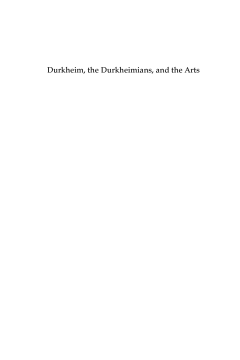
BOOK
Durkheim, the Durkheimians, and the Arts
Alexander Tristan Riley | William Watts Miller | W.S.F. Pickering†
(2013)
Additional Information
Book Details
Abstract
Using a broad definition of the Durkheimian tradition, this book offers the first systematic attempt to explore the Durkheimians’ engagement with art. It focuses on both Durkheim and his contemporaries as well as later thinkers influenced by his work. The first five chapters consider Durkheim’s own exploration of art; the remaining six look at other Durkheimian thinkers, including Marcel Mauss, Henri Hubert, Maurice Halbwachs, Claude Lévi-Strauss, Michel Leiris, and Georges Bataille. The contributors—scholars from a range of theoretical orientations and disciplinary perspectives—are known for having already produced significant contributions to the study of Durkheim. This book will interest not only scholars of Durkheim and his tradition but also those concerned with aesthetic theory and the sociology and history of art.
William Watts Miller is editor of Durkheimian Studies/Etudes Durkheimiennes and a member of the board of the British Centre for Durkheimian Studies. He has published extensively in the field, collaborated in translations, and is a member of the team producing a new critical edition of Durkheim's Complete Works. His most recent book is A Durkheimian Quest: Solidarity and the Sacred (Berghahn Books, 2012).
Alexander Tristan Riley is Professor of Sociology at Bucknell University. With the aid of the late Philippe Besnard, he edited the war correspondence of Robert Hertz, Un ethnologue dans les tranchées. He is the author of Godless Intellectuals?: The Intellectual Pursuit of the Sacred Reinvented (Berghahn Books, 2010) and currently he is contemplating a book on literary autobiography, cultural sociology, and the writing of Michel Leiris.
W.S.F. Pickering† taught sociology in Canada from 1958 to 1966 and then at Newcastle-upon-Tyne until he retired in 1987. Although his original interest was in the sociology of religion, he later turned to the work of Durkheim. In 1975 he published Durkheim on Religion (Routledge) and in 1984 Durkheim’s Sociology of Religion: Themes and Theories (Routledge). He also contributed to and helped produce other books on Durkheim and his followers. In 1991, he helped found the British Centre of Durkheimian Studies, of which he was the General Secretary.
“The strengths of the book are the featuring of the diversity of the [Durkheim] tradition and the many lines linking broadly Durkheimian themes to current work on the arts… [It] illustrates powerfully how Durkheimian concepts live with us today and how we can benefit by comparisons with this rich tradition. Read and be inspired.” · American Journal of Sociology
“The triumvirate editors have put together an imaginative set of authors, representing different generations, who have already made important contributions to recent Durheimiana.” · Canadian Journal of Sociology/Cahiers canadiens de sociologie
“…offers readers a tour of twentieth-century French intellectual history by one of the finest Durkheimian scholars writing today. At the heart of the book is Durkheim’s concept of the sacred. Yet despite the seemingly familiar starting point, Riley’s book sparkles with creative ideas, intriguing concepts, and introductions to a broad class of characters. Riley is not a historian of ideas but a sociologist and social theorist. Consequently, he frames the telling of this history with key theoretical categories, which help order a broad range of material…Part of the book’s (mystic) charm is its comprehensive and suggestive nature.” · Sociology of Religion
“…an important volume of original thinking that will make a significant contribution, both to a new understanding of Durkheim/Durkheimianism and to the sociological understanding of art… The contributors are true, world-renowned experts in Durkheim and his school and his legacy.” · Jeff Alexander, Yale University
“The essays are uniformly intensely learned and clearly written, which is a real feat in a book involving so many people.” · Howie Becker, author of Outsiders and Art Worlds
Table of Contents
| Section Title | Page | Action | Price |
|---|---|---|---|
| Durkheim, the Durkheimians, and the Arts | 1 | ||
| Contents | 7 | ||
| Illustrations | 9 | ||
| Introduction to Durkheim, the Durkheimians, and the Arts | 11 | ||
| Chapter 1 Total Aesthetics | 26 | ||
| Chapter 2 Durkheim, the Arts, and the Moral Sword | 53 | ||
| Chapter 3 Durkheim and Festivals | 69 | ||
| Chapter 4 The Power of Imagination and the Economy of Desire | 87 | ||
| Chapter 5 Dostoevsky in the Mirror of Durkheim | 105 | ||
| Chapter 6 Durkheim, L’Année sociologique, and Art | 129 | ||
| Chapter 7 Marcel Mauss on Art and Aesthetics | 143 | ||
| Chapter 8 Too Marvelous for Words . . . | 164 | ||
| Chapter 9 Total Art | 188 | ||
| Chapter 10 Sex, Death, the Other, and Art | 212 | ||
| Chapter 11 Apophasis in Representation | 233 | ||
| Chapter 12 Acéphale/Parsifal | 268 | ||
| Contributors | 309 | ||
| Index | 313 |
